Monday, May 22nd 2017

AMD Ryzen-optimized C and C++ Compilers Improve Performance
AMD followed up its Ryzen processor launch with support for the software development ecosystem by releasing special C and C++ compilers that let you make software that can fully take advantage of the "Zen" micro-architecture. The new AOCC 1.0 C/C++ compilers by AMD are based on LLVM Clang, with "Zen" specific patches. AMD claims AOCC offers improved vectorization and better code generation for "Zen" based CPUs. It also includes a "Zen" optimized linker.
Phoronix benchmarked AOCC against other more common compilers such as GCC 6.3, GCC 7.1, GCC 8, LLVM Clang 4.0, and LLVM Clang 5.0 using a Ryzen 7-1700 eight-core processor powered machine, running on Ubuntu 17.04 Linux, and found that AOCC offers higher performance than GCC in most cases, LLVM Clang in some cases, and marginally higher performance than LLVM Clang in some cases. Find more results in the link below.
Source:
Phoronix.org
Phoronix benchmarked AOCC against other more common compilers such as GCC 6.3, GCC 7.1, GCC 8, LLVM Clang 4.0, and LLVM Clang 5.0 using a Ryzen 7-1700 eight-core processor powered machine, running on Ubuntu 17.04 Linux, and found that AOCC offers higher performance than GCC in most cases, LLVM Clang in some cases, and marginally higher performance than LLVM Clang in some cases. Find more results in the link below.
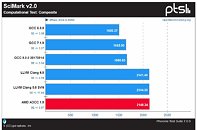
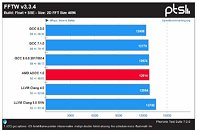
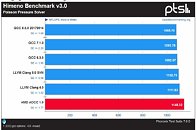
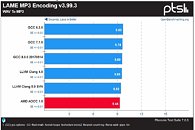
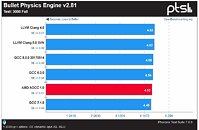
25 Comments on AMD Ryzen-optimized C and C++ Compilers Improve Performance
Horrible results I must say :)
In all instances where it wins, Clang also wins, so the win is not because of this compiler. In 2 out of the 3 tests where it looses, it also trails Clang.
Guess why no one wants to talk about linux benchmarking? Intel isn't so rosy and you can see the actual IPC of Ryzen.
No one's denying Intel may look better when using ICC, but there's no conspiracy where Intel's performance is made to look better than it actually is.
You're implying Windows code is usually compiled using ICC, but I bet you can't post a source for that.
Also, we all know linux is going to be far ahead on optimization. FX series performed quite a bit better on linux.
And you not it was like 7 years ago. VIA is mentioned in there, that's how old it is.
Also, I've been watching Phoronix for years and I've never mentioned AMD performing any better. Do you do not need to provide sources, because "we all know".It's the same on Windows: IPC is about the same, but Ryzen is clocked significantly lower. Thus single thread performance trails.
Generally both GCC and LLVM are better at optimizing code than Microsoft's compiler.No, not scheduling.
Compiler optimizations applies a set of generic optimizations, and sometimes a few CPU specific ones. Zen doesn't seem to offer a lot of new features vs. the competition.
Running ICC_Patch.exe shows: